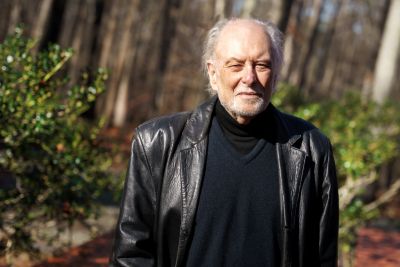Walter Mignolo Retires After 30 Years as Leading Theorist of Decoloniality

Last month, scholars from across the United States, Haiti and Romania gathered on Duke’s campus to celebrate the career of Walter Mignolo, the William Hane Wannamaker Distinguished Professor of Romance Studies, Literature and Cultural Anthropology.
During more than 30 years at Duke, Mignolo became a leading theorist of the connections between modernity and the colonial system. In over a dozen acclaimed books, including “The Darker Side of the Renaissance,” “Local Histories/Global Designs” and 2021’s “The Politics of Decolonial Investigations,” Mignolo argued that the modern world could not exist with colonialism.
To respond to those injustices, Mignolo argues for “decoloniality” and “delinking” from modernity and coloniality. Doing so would require altering ways of thinking that many Westerners have assumed to be natural for centuries.
Titled “Walter Mignolo: De/Coloniality 30 Years After,” the event celebrating his upcoming retirement featured tributes and speeches from scholars across multiple disciplines and geographic areas who worked alongside Mignolo and were inspired by his works.
“I cannot emphasize enough how important Walter’s presence as the senior Latin Americanist (who was not a Latin Americanist) was from the time I arrived at Duke as an assistant professor,” said Esther Gabara, a professor of Romance Studies.
“I deeply appreciate that we could be allies, friends and occasionally coconspirators, without any loyalty pledge to a single school or univocal articulation of where scholarly and critical work might go,” she continues. “Most of all, I want to recognize the brilliant wit and keen insight that he offers at key moments when bureaucracy does its thing.”
“Teaching with Walter in mid-1990s, I realized that my work on Arab women’s war writings was not so much about postcolonialism or subalternity or dissidence or feminism but about intellectuals’ ongoing critique from within the colonized experience even after the colonizer left,” said miriam cooke, an emerita professor of Asian & Middle Eastern Studies. “With the students we spent time attacking the ‘postcolonial’ — how to find a right word to deal with the survival of the colony in the ex-colony.”
Other speakers included University of Haiti professor and former Haitian ambassador to the United States Jean Casimir, political theorist Michael Hardt, emeritus Religious Studies professor Bruce Lawrence, Mexican-American artist Pedro Lasch, and more.
Reading a selection from a forthcoming work, Michaeline Crichlow, a professor of African & African American Studies, offered a fitting farewell to Mignolo.
“My Caribbean colleague and collaborator, Patricia Northover, and I have found Mignolo’s decolonial ideas, the methodology that his arguments outline, from the global South,” Crichlow said. “They signal, like Walter the man himself, an openness, a conceptual generosity, an invitation to coimagine with people everywhere, say, an invitation to rethink the world afresh, to undiscipline and transdiscipline.
“We will miss your presence, Walter. Not only for your stimulating scholarship, but also your generosity of time, your openness to meet, discuss seriously and engage with faculty and students. The neoliberal way of life has no way to measure these efforts and these sterling qualities. I still look forward to engaging with you, Walter, and on this theme of decoloniality, modernity and the enduring hold of modernization that still infects the many souths. Thanks for your 30 year-tutorial, Walter.”
